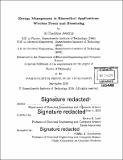Energy management in biomedical applications : wireless power and biosensing
Author(s)
Avestruz, Al-Thaddeus
DownloadFull printable version (45.42Mb)
Other Contributors
Massachusetts Institute of Technology. Department of Electrical Engineering and Computer Science.
Advisor
Steven B. Leeb.
Terms of use
Metadata
Show full item recordAbstract
Wireless health and fitness devices as well as traditional medical devices such as cardiac and neurological implants, skin patch sensors, and automatic drug delivery pumps extend and improve life by providing therapy, monitoring, and diagnostics. They ensure health and safety while promoting prevention and wellness. These devices are found in chronic and acute settings that range from emergency and critical care to personalized health and telemedicine; they accelerate medical research and support data-driven medicine. The push towards the ubiquity of ever smaller devices with more functionality compels power-centric strategies in every aspect of design. Long-term implantables such as neural implants for the treatment of Parkinson's disease and epilepsy traditionally rely on primary cell batteries, which occupy a large portion of the implant volume and when exhausted require a new surgery for replacement. The motivation of the thesis is to reduce the size (weight and volume) and increase the lifetime of neural implants through the use of a smaller rechargeable battery. The two strategies chosen in this thesis are: 1) using a new spread-spectrum wireless power transfer to recharge and ultimately, eliminate the battery through direct powering; 2) reducing power consumption through the use of closed-loop decision and parameterization of electrical stimulation using feedback from neural sensing. The first part of this thesis is the development of spread-spectrum wireless power transfer to deliver power over many frequencies over a uniform single-sided magnetic field, which enables better design of systems with various physical dimensions, lower tissue loss, and less sensitivity to component tolerances, while remaining within the regulatory limits for electromagnetic interference. The investigation encompasses the design of a spread-spectrum transmitter and modulation method that resolves the ostensible paradox of "resonant, yet spread-spectrum", a passive power receiver, and power transfer using a uniform single-sided magnetic field. The second part of this thesis involves the design of a system to amplify and extract the spectral power of neural electrical signals from the brain. From the spectral power, "biomarkers" are extracted to titrate deep brain electrical stimulation to improve therapy and better utilize this functionality that dominates the implant power consumption.
Description
Thesis: Ph. D., Massachusetts Institute of Technology, Department of Electrical Engineering and Computer Science, 2016. Cataloged from PDF version of thesis. Includes bibliographical references (pages 273-283).
Date issued
2016Department
Massachusetts Institute of Technology. Department of Electrical Engineering and Computer SciencePublisher
Massachusetts Institute of Technology
Keywords
Electrical Engineering and Computer Science.